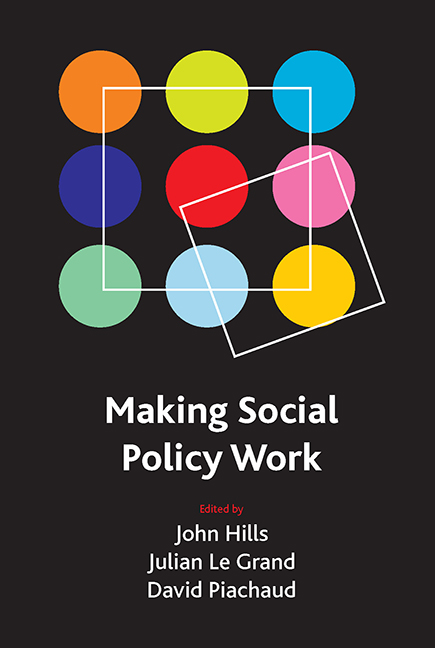Book contents
- Frontmatter
- Contents
- List of tables and figures
- Acknowledgements
- Notes on contributors
- one Introduction
- Part One The aims of social policy
- Part Two Delivering social policy
- Part Three Redistribution: between households; over time; between areas
- Appendix: Bibliography of Howard Glennerster’s publications
- Index
one - Introduction
Published online by Cambridge University Press: 09 September 2022
- Frontmatter
- Contents
- List of tables and figures
- Acknowledgements
- Notes on contributors
- one Introduction
- Part One The aims of social policy
- Part Two Delivering social policy
- Part Three Redistribution: between households; over time; between areas
- Appendix: Bibliography of Howard Glennerster’s publications
- Index
Summary
How to make social policy work? How can policies be designed so as to achieve the aims of government in the social arena? How can these policies be implemented in such a way so as to promote the desired aims but without damaging other aims that we might wish to pursue? Can we ensure that social policies have only those consequences that are intended?
Howard Glennerster, whose work has inspired the contributions to this book, has devoted much of his professional life to answering such questions and the book attempts to build on his contributions. It is thus concerned, not so much with the theory of social policy, but with its practice. The chapters of the book, all written by colleagues of Howard, all distinguished in their own right, focus on the historical development and practical implementation of policy in key areas of social concern. The main focus of the book is on contemporary issues, particularly on the ways in which social policy in Britain has been reshaped in the first decade of the 21st century, the arguments that lay behind those changes, and the issues that they raise for the future evolution of policy.
The structure of the book
The first part of the book looks at the underlying aims of social policy. Jose Harris uses her analysis of the Poor Law to deconstruct some of the mythology surrounding the history of the welfare state. She argues that seemingly quite dated policies and institutions of past eras may contain elements that are constant and universal, or at least recurrent, in many different contexts and epochs, while other apparently ‘timeless’ models are actually time-specific. She suggests that the Poor Law was less unpopular with poorer classes and not as universally harshly administered than often portrayed. Some at least of the strengths and virtues often ascribed to the welfare state may more properly be seen stemming originally from the Poor Laws, while other, seemingly timeless, aspects of the post-war welfare state, such as its universalism, were in many ways a product of the particular period in which they were introduced. There are lessons to be learned from history about what works; but they may not always be the most obvious ones.
- Type
- Chapter
- Information
- Making Social Policy WorkEssays in honour of Howard Glennerster, pp. 1 - 10Publisher: Bristol University PressPrint publication year: 2007

